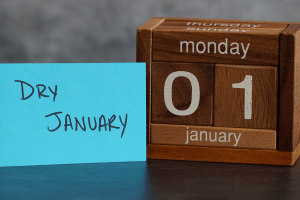Rethinking Your Holiday Drinking
The holidays are a time for celebration and alcohol is often present at festive gatherings. Despite all good plans, people may consume alcohol more than they intended.
This holiday season, be mindful of your alcohol consumption if you choose to drink. Remember that alcohol decreases inhibitions that may lead to regrettable social interactions and even may impact a person’s ability to protect themselves and others from COVID-19. Alcohol also impairs both physical and mental abilities which can produce adverse consequences like hangovers, falls, traffic accidents, blackouts, and even overdoses. Drinking to cope with stress is particularly problematic because when the alcohol wears off, the stress returns with a vengeance. Remember the U.S. Dietary Guidelines for Americans which recommend that alcohol intake be limited to 2 drinks or less in a day for men and 1 drink or less in a day for women. Also, keep in mind that some people should not drink alcohol for any reason, including women who are pregnant or planning to become pregnant, or individuals under the age of 21—the legal age for drinking in the United States.
Even though it’s the holiday season, if your interaction with alcohol has been problematic, it’s not too early to start thinking about the new year, a time when many people begin to focus on their health and positive life changes. A popular New Year’s Resolution is to examine one’s relationship with alcohol and participate in Dry January, a trend that emphasizes taking a break from alcohol for the entire month. It also provides an opportunity to cultivate alternatives for relaxing, socializing, and coping with stress.
Changing behaviors can be challenging, especially those that are unhealthy. A way to cut back or quit drinking alcohol is to begin by asking yourself why you drink or what’s your motivation? Is it the taste, to relax, to relieve anxiety, or to “loosen up” and have fun? Once you know why you drink, you can identify other ways of achieving those motives without alcohol. For example, instead of reaching for a beer or a glass of wine to relax after work, perhaps going for a walk could serve as a healthier alternative. Behaviors are strengthened through repetition, so the more often you engage in alternatives to drinking, the easier it should become to cut down or skip the alcohol.
Below are some specific strategies to try.
- Keep track of how much you drink. Making a note of each drink before you consume it may help you slow down when needed.
- Know the standard drink sizes so you can count your drinks accurately.
- Set goals related to alcohol such as how many days a week you plan to drink and how many drinks you’ll have on those days.
- If drinking has occupied a lot of your time, or you’ve used it to cope with problems or manage moods, then seek other, healthy activities or ways to deal with those areas of your life.
- Avoid triggers that make you drink even when you don’t want to. For example, if certain activities, times of day, or feelings trigger the urge, plan something else to do instead of drinking.
- Plan to handle urges to drink, such as remind yourself of your reasons for changing your drinking patterns or talk things through with someone you trust.
- Have a polite, convincing “No, thanks” ready, so when you are offered a drink you can say no quickly and not have time to think of excuses to go along.
If you have been drinking heavily for a long time, talk to your healthcare provider before suddenly quitting drinking. Quitting suddenly after a prolonged period of heavy drinking can result in potentially painful or even life-threatening withdrawal symptoms. Doctors can prescribe medications to address these symptoms and make the process safer and less distressing.
Visit NIAAA’s website Rethinking Drinking for tools to help you examine your drinking pattern and calculate how much alcohol you may be consuming. This website also provides tips to help cut back or stop drinking. If you think you have a problem with alcohol and need help, visit the NIAAA Alcohol Treatment Navigator to learn about quality care and treatment options near you.
Best wishes,
George F. Koob, Ph.D.
NIAAA Director
Need Help for an Alcohol Problem?
If you’re having an emergency, call 911. If you are having suicidal thoughts, call 911, go to the nearest emergency room or call the toll-free, 24-hour National Suicide Prevention Lifeline at 1-800-273-TALK (8255) to help you through this difficult time.
The NIAAA Alcohol Treatment Navigator can help you recognize and find high quality treatment for alcohol use disorder. If you drink excessively, seek medical help to plan a safe recovery as sudden abstinence can be life threatening. NIAAA’s Rethinking Drinking can help you assess your drinking habits and provides information to help you cut back or stop drinking.








